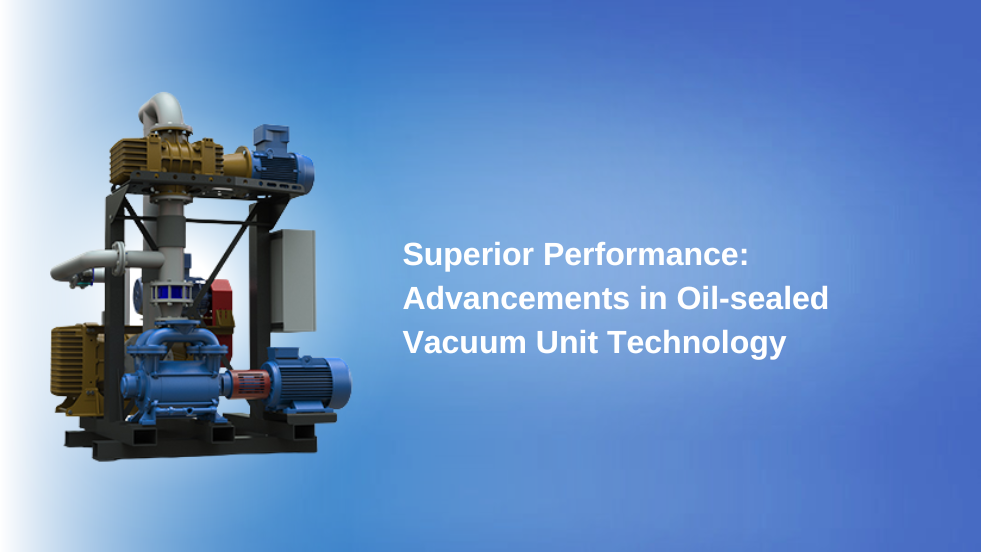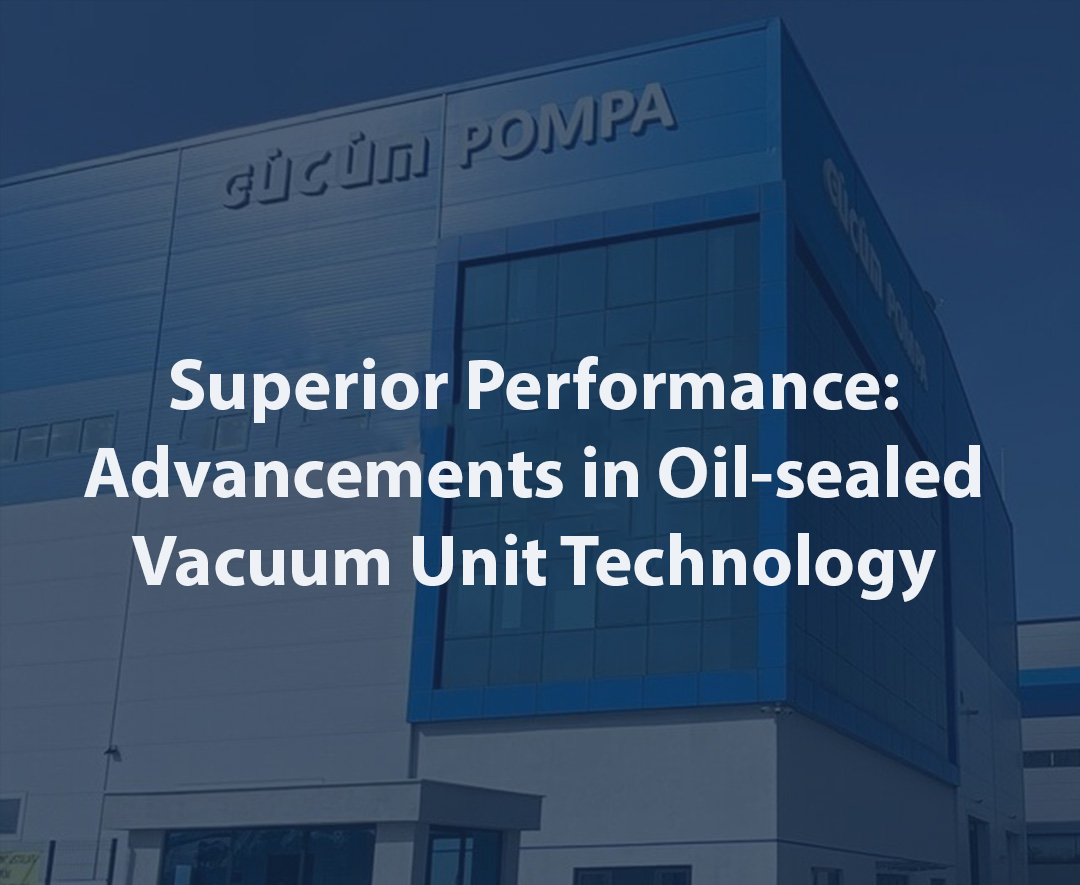Superior Performance: Advancements in Oil-sealed Vacuum Unit Technology
Contents
- What is an Oil-Tight Vacuum Unit and How Does It Work?
- What are the Industrial Usage Areas of Oil-Tight Vacuum Unit?
- How Does the Working Principle of Oil-Tight Vacuum Units Work?
- What are the Latest Developments in Oil-Tight Vacuum Unit Technology?
- What are the Advantages and Benefits of Oil-Tight Vacuum Units?
- What are the features to consider when choosing an oil-tight vacuum system?
- How to Increase Energy Efficiency with an Oil-Tight Vacuum Unit?
- How to Provide Environmentally Friendly Solutions with Oil-Tight Vacuum Units?
- How to Reduce Industrial Costs with Oil-Tight Vacuum Units?
- How Should Oil-Tight Vacuum Units Be Maintained?
- How to Increase the Performance and Durability of Oil-Tight Vacuum Units?
- What are the Differences Between Oil-Tight Vacuum Units and Other Vacuum Systems?
What is an Oil-Tight Vacuum Unit and How Does It Work?
The oil-tight vacuum unit is a device used for vacuum removal of liquids and gases in industrial applications. These units are designed with special engineering solutions to prevent oil leaks during vacuum operation. Compared to traditional vacuum systems, the contamination and maintenance needs caused by oily environments are eliminated with such systems. Oil-tight vacuum units are generally preferred in areas that require precise work, such as food processing, pharmaceutical production and chemical industry.
As a working principle, the vacuum unit first absorbs air or gases and condenses these gases in a closed environment and throws them out. Special engineering solutions are applied to prevent any oil from leaking from the system during this process. During the suction of air or gases, vacuum pressure is optimized to ensure an efficient process. One of the advantages of these systems is that they provide cleaner and longer-lasting operation by preventing oily leaks.
What are the Industrial Usage Areas of Oil-Tight Vacuum Unit?
Oil-sealed vacuum units are frequently used in industrial areas to meet high performance requirements. It is used effectively especially in food production, pharmaceutical industry, chemical and automotive sectors. These vacuum units are preferred in the food industry because hygiene conditions are important. Its oil-tight properties help maintain cleanliness in food processing processes, ensuring products comply with quality standards.
Similarly, in the chemical and pharmaceutical industries, oil-tight vacuum units are essential to ensure the cleanliness and safety of the system. In production with chemical substances, any leakage or contamination may negatively affect the production process. These vacuum units are frequently used, especially in places where sensitive chemicals need to be vacuumed. In the automotive industry, oil-tight vacuum systems provide an efficient production process by ensuring the cleaning of parts on the production line.
How Does the Working Principle of Oil-Tight Vacuum Units Work?
The working principle of the oil-tight vacuum unit is basically based on vacuuming and condensing air or gases. These units are designed to prevent the leakage of liquids and oils while taking air or gas from the environment under vacuum. The vacuum unit optimizes air pressure by working with a closed system. In this way, there is no oil leakage while the vacuumed gases are transported inside the device.
Highly efficient operation is ensured in such vacuum units by using oil-tight seals and special filters. The temperature and pressure of the environment are constantly monitored, so that the performance of the device is constantly kept at maximum level. The oil-tight feature ensures continuous clean operation and low maintenance costs, especially in industrial areas. These systems provide environmentally friendly and energy-saving solutions while operating efficiently.

What are the Latest Developments in Oil-Tight Vacuum Unit Technology?
In recent years, there have been significant advances in oil-tight vacuum unit technology. These developments allow vacuum units to be more efficient, durable and environmentally friendly. Energy efficiency, in particular, is one of the main goals of vacuum systems design today. New generation vacuum units provide higher vacuum power with lower energy consumption. These technologies offer significant advantages in terms of sustainability in industrial applications.
In addition, thanks to the integration of digital control systems, the performance of vacuum units can be monitored more precisely. These innovations make maintenance processes easier and reduce the possibility of malfunctions. Innovations in sealing technologies have helped create safer and longer-lasting systems. Thus, while the efficiency of businesses from vacuum units increases, environmentally friendly production processes are also supported.
What are the Advantages and Benefits of Oil-Tight Vacuum Units?
Oil-tight vacuum units offer many advantages in industrial applications. Firstly, a significant reduction in cleaning and maintenance costs is achieved by preventing oil leaks. Oil leaks in traditional vacuum systems reduce the efficiency of the device and cause parts to wear over time. Oil-tight vacuum units eliminate such problems and provide a longer-lasting and more efficient system.
Besides this, such units are environmentally friendly. Oily leaks can cause environmental pollution and the use of such systems can have negative effects on the environment. Oil-tight vacuum systems contribute to sustainable production processes by operating with high efficiency without harming the environment. It is also very advantageous in terms of energy efficiency. The ability to obtain high vacuum power with low energy consumption makes these systems economically attractive.
What are the features to consider when choosing an oil-tight vacuum system?
There are some important features to consider when choosing an oil-tight vacuum system. First, the capacity of the vacuum unit should be determined according to the applications you need it for. In order for the product to operate at high efficiency, it is important to choose a capacity suitable for the size of the environment. The effectiveness of oil sealing technology plays a big role in long-term use. High-quality sealing materials increase the reliability of the system.
Another important factor is the energy efficiency of the device. Oil-sealed vacuum units generally offer high performance, but savings can be made with proper energy management. Therefore, models that minimize energy consumption should be preferred. Maintenance requirements and durability of the system should also be considered. Easy-to-maintain and long-lasting devices offer the most efficient solutions for businesses.
How to Increase Energy Efficiency with an Oil-Tight Vacuum Unit?
Oil-tight vacuum units offer significant advantages in energy efficiency. These systems provide high vacuum power with low energy consumption thanks to their optimized design. There are several ways to increase the energy efficiency of the vacuum unit. First of all, correct capacity selection is a critical factor in energy saving. Choosing a device with the right vacuum power according to the needs of your business prevents unnecessary energy consumption.
In addition, regular maintenance of vacuum units is another important step that increases energy efficiency. Cleaning the filters, proper operation of the motors and checking the sealing materials ensures that the device operates more efficiently. The use of digital control systems allows energy consumption to be monitored and optimized. In this way, operating costs are reduced and environmental impacts are minimized.
How to Provide Environmentally Friendly Solutions with Oil-Tight Vacuum Units?
Oil-tight vacuum units are important technologies that offer environmentally friendly solutions. One of the biggest advantages of these systems is the prevention of environmental pollution by preventing oily leaks. In traditional vacuum systems, oil leaks can damage the environment and cause contamination. However, oil-sealed vacuum units offer an environmentally friendly solution by eliminating such problems.
In addition, it reduces carbon emissions by providing energy efficiency. Low energy consumption minimizes environmental impact and helps businesses achieve their sustainability goals. These vacuum units not only provide a cleaner and safer production environment, but also create an environmentally friendly production process.
How to Reduce Industrial Costs with Oil-Tight Vacuum Units?
Oil-sealed vacuum units can significantly reduce costs in industrial processes. Firstly, the long life and low maintenance requirements provided by the system reduce the maintenance costs of businesses. In traditional vacuum systems, oil leaks and wear lead to frequent maintenance requirements. However, oil-sealed systems operate more efficiently with fewer malfunctions and maintenance needs.
Thanks to energy efficiency, businesses save on energy costs. Low energy consumption leads to reduced annual energy bills. The highly efficient operation of these vacuum units also increases workforce efficiency. All these factors help reduce industrial costs in the long run.
How Should Oil-Tight Vacuum Units Be Maintained?
Regular maintenance of oil-tight vacuum units is important to keep the performance of the device high and extend its life. First, the oil sealing systems of the vacuum units should be checked. Periodic replacement of seals and filters increases the efficiency of the device. Maintaining main components such as the motor and pump ensures that the system operates smoothly for a long time.
Another maintenance step is monitoring air pressure. Pressure level is a critical factor for the efficient operation of the vacuum unit. Low pressure levels can adversely affect the performance of the system. Therefore, pressure should be checked regularly. All these maintenances increase the performance of the device and prevent possible malfunctions.
How to Increase the Performance and Durability of Oil-Tight Vacuum Units?
The performance and durability of oil-sealed vacuum units can be increased with proper maintenance and use. First, working conditions suitable for the capacity of the vacuum unit must be provided. Overload may shorten the life of the device and reduce efficiency. Therefore, it is important to use the device under appropriate conditions and operate it within the limits specified by the manufacturer.
The effectiveness and quality of the oil seal system is an important factor affecting long-term performance. High-quality gaskets and seals prevent oil from leaking, allowing the device to work longer. The efficiency of the device can be increased with regular maintenance and checks, so businesses can achieve consistently high performance.
What are the Differences Between Oil-Tight Vacuum Units and Other Vacuum Systems?
The biggest difference between oil-tight vacuum units and other vacuum systems is their sealing properties. Conventional vacuum systems can experience oil leaks, which can negatively affect the efficiency and environmental friendliness of the device. However, oil-tight vacuum units prevent such leaks, providing safer and more environmentally friendly operation.
Another difference is the maintenance requirements. Oil-tight vacuum units require less maintenance and have a long life. This reduces the maintenance costs of businesses and ensures efficient operation of the device. In terms of energy efficiency, oil-tight systems provide high performance with low energy consumption, which offers economic advantages for businesses.
